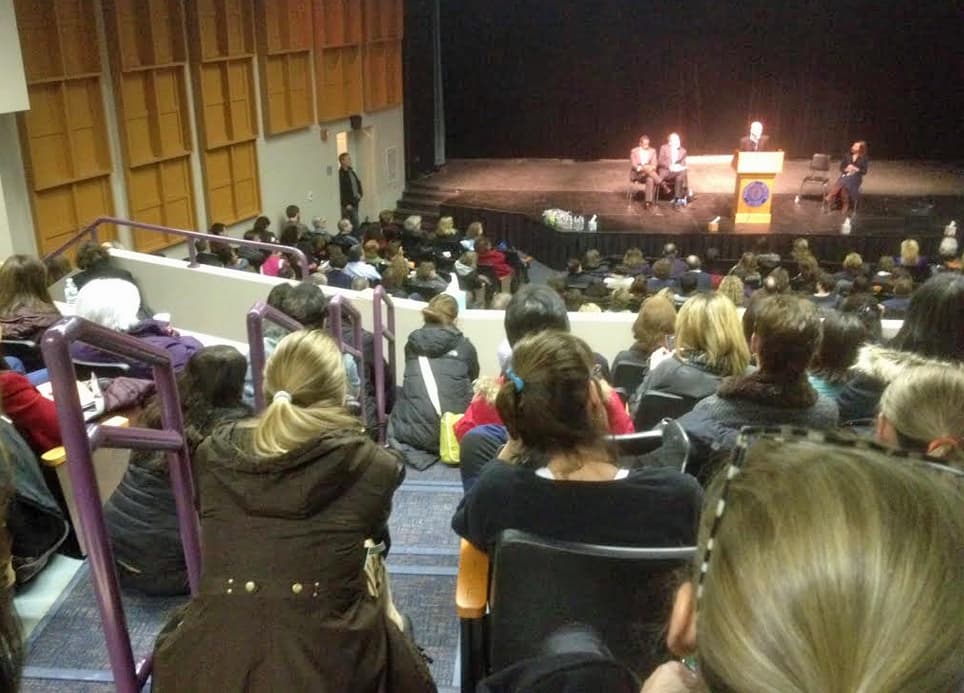Advertisement
Newton Parents, Community Leaders Seek Answers After Teen Suicides
ResumeThe first was last October: a promising senior who was fighting an eating disorder. The second suicide within two weeks was another young woman, a sophomore who struggled with depression. Then two days ago, the city of Newton buried its third teen, a boy, a junior who killed himself without any warning to his family, friends or teachers.

"Who could ever imagine that we’d be back here again under similar circumstances?" asked Newton Public Schools Superintendent David Fleishman Tuesday night as he welcomed nearly 400 parents to another community forum on teen suicide.
Outside the auditorium at Newton South High School, two moms stopped to share stories about Roee Grutman, 17, who was buried Monday. The suicide of this outgoing student seems to have stunned everyone who knew him.
"We’re all worried about our kids, every parent I've spoken to tonight is worried about their kid," said Barbara Pittel, whose children knew Grutman.
Faith Paul’s son had three classes with him.
"When my son transferred in middle school, Roee was the first person who made friends with him," Paul recalled. "He was just awesome."
Parents are worried, because "if [suicide] happened to Roee, it could happen to our kids," Paul said.
"Nobody caught anything," Pittel added. "No one knew that there was anything wrong."
Much of what parents are learning boils down to this: suicide is complex. At Tuesday's forum, parents heard that the vast majority of teenagers who die as a result of suicide have a diagnosed mental illness, and were reminded that mental illness is treatable if parents and children seek help.
What’s hard is striking the right balance between talking about suicide openly with teenagers, but not dwelling on it so that a child who is at risk gets stuck in those thoughts.
Dr. Susan Swick, chief of child psychiatry at Newton Wellesley Hospital, has been advising Newton schools and spoke to parents.
"With the outpouring of grief that follows and sustained attention to the individual, to the subject of suicide, that can resonate with a vulnerable person — not every person, but with a vulnerable person — in a way that would make an impulsive suicide attempt more likely," Swick said.
After the deaths of Katie Stack, 15, and Karen Douglas, 18, last October, Newton brought in outside experts and spoke to high school teachers in an attempt to identify children who adults thought might be vulnerable. Swick says everyone can help children become less vulnerable by building up their resilience.
"This involves maintaining good social connections," Swick said. "It's about coping skills, it's about self-care, it about getting good sleep, adequate exercise and nutrition. It's about cultivating an ability to be flexible, to use humor, some creativity. There’s no one recipe for the things that you do, but it's cultivating good behaviors that build resilience."
And make sure, Swick added, that children have a network of adults who know them, talk to them and keep an eye on them.
Larry Berkowitz, who is also advising Newton schools through Riverside Trauma Center, urged adults to stop in these next few days and weeks and just listen to their children, "allowing them to talk with us about the loss that they’ve experienced. We have to tell them that we’re sorry they’ve lost a friend and a community member."
When this latest period of grieving becomes less raw, Newton schools plan to resume a suicide prevention training program that began after the deaths of Douglas and Stack. Many parents say they didn’t know about this program and wondered why the schools weren’t doing anything in response to the two earlier suicides. In fact, student peer counselors, working with teachers at both of the city's high schools, had planned to begin small group discussions that would reach every students the week after February school break. They will now be postponed.
Outside the schools, Newton Mayor Setti Warren says a new coalition of 50 different community groups has formed to promote emotional well-being for all ages.
"We’ll extend that beyond the Newton Public Schools into the community so we can reach families and young people outside our buildings," Warren said.
Parents broke into small groups after Tuesday's forum to talk about their individual experiences and fears. One mom wondered why her son was rearranging his room and reorganizing his books after Grutman's death. Another said her son couldn't stop crying. One mother wondered how to persuade her daughter to see a counselor. Many of the discussions came back to the question why — a question that can never be fully answered after a suicide.
"If I had all the answers we wouldn’t be speaking," said Lila McCain, whose daughter Karen Douglas killed herself in October. McCain says it’s hard to know if anything could have prevented her daughter’s death.
"In Karen's case, the love was there. She had an amazing team, amazing teachers, and she beat us to it," McCain said. "And I’m going to just live with that pain."
McCain isn’t just living with the pain. She and her other daughter have started an online campaign called Get Real to promote healthy body images for girls. It's an example of the projects Newton residents hope will help the city heal and build a healthier future.
